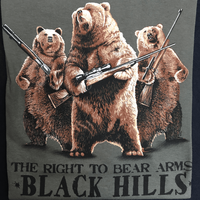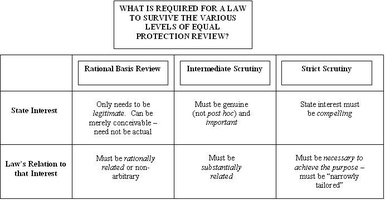Well, our vaunted United States Supreme Court has agreed to take up a case regarding the Second Amendment. This is pretty uncommon, but it does happen – mostly because the Supremes over the years haven't dared to actually do their jobs to the fullest, so their decisions seem to encompass a narrow scope and half-measures, never fully putting to bed that the Second Amendment clearly gives the right of an individual to "keep," which means to own, and "bear," which means to carry, arms on one's person.
The Second Amendment makes no distinction between open and concealed carry, and thus any argument against either is moot. Nor does it make mention of licenses and/or permits, which is what this upcoming case is about, so these, too, are moot.
The case itself is a travesty of justice and should never have gotten to the high court.
The fact is that the Second Amendment, like all the first 10 amendments, is as permanent and binding as every article of the Constitution. And thanks to Article VI, Clause 2, these amendments, like the articles, are "the supreme Law of the Land. …"
What I'm saying is that if the courts actually did what they are charged to do, every challenge to the Second Amendment would be rejected, on its face, by every court in the land – period.
How am I so sure of this? Well, as I've said any number of times, I'm not a constitutional scholar or great jurist with an army of researchers, but I can read.
And as usual, the founders had plenty to say on the subject, affirming that the framers did intend the Second Amendment to encompass an individual's right to carry guns for self-protection.
The first state Declaration of Rights to use the term "bear Arms" was that of Pennsylvania in 1776: "that the people have a right to bear Arms in defense of themselves and the state." Pretty clear. No ambiguity there.
Noah Webster was certainly in a position to know what the Second Amendment phrase "bear Arms," meant. A prominent Federalist, he wrote the first major pamphlet in support of the Constitution when it was proposed in 1787, in which he stated: "before a standing army can rule, the people must be disarmed; as they are in almost every kingdom in Europe. The supreme power in America cannot enforce unjust laws by the sword; because the whole body of the people are armed. …" Again, pretty straightforward.
In fact, in Webster's famous dictionary, first published in 1828, it defines "bear" as "to wear; to bear a mark of authority or distinction; as to bear a sword, a badge, a name; to bear Arms in a coat." Continuing to the word "Arms"; "weapons of offense, or armor for defense and protection of the body." So according to Webster, "bear Arms" is to carry or wear weapons openly or concealed. Further, Webster defines "pistol" as a: "small firearm, or smallest firearm used … small pistols are carried in the pocket."
Thomas Jefferson was an admirer of the writings of Italian Cesare Beccaria. Beccaria wrote an essay on "Crimes and Punishments" that greatly influenced the Eighth Amendment on cruel and unusual punishment. Jefferson wrote word for word passages from Beccaria in a commonplace book (a journal). One such passage was a denouncement of laws which forbid "di portor le armi" – in other words, to forbid the bearing, carrying or wearing of Arms. At the end of this rather lengthy passage was the money quote, as it were:
"… Does the execution of this law deprive the subject of that personal liberty, so dear to mankind and to the wise legislator; and does it not subject the innocent to all the disagreeable circumstances that should only fall on the guilty? It certainly makes the situation of the assaulted worse, and of the assailants better, and rather encourages than prevents murder, as it requires less courage to attack unarmed than armed."
Beccaria's passage was the source in Jefferson's proposed Virginia Constitution of 1776: "No free man shall ever be debarred the use of Arms." By the way, Thomas Jefferson carried pocket pistols – concealed pocket pistols – without a permit!
John Adams wrote of the right of "Arms in the hands of citizens, to be used at individual discretion … in private self-defense."
In 1789, mere days after Madison proposed the Bill of Rights, Tench Coxe, a friend and correspondent of both Madison and Jefferson, wrote that this would confirm to the people "their right to keep and bear their private Arms." Interestingly, neither man corrected Mr. Coxe by writing that the Second Amendment was only referencing the militia – because it wasn't then, and isn't still.
Finally, there is the question of having to register your weapon or obtain a license to carry. Is this an infringement of the Second Amendment? Yes, it is. Sen. Ted Cruz described it well: "Would one need to register or obtain a license to exercise their religious or political beliefs or free association such as the First Amendment delineates? Wouldn't you think it absurd to require a permit before objecting to unreasonable search and seizure?"
The bottom line is that an infringement is an infringement regardless of the right it infringes upon, and it is clear that most, if not all, gun-control measures infringe upon an individuals right to keep and bear Arms.

 www.wnd.com
www.wnd.com
The Second Amendment makes no distinction between open and concealed carry, and thus any argument against either is moot. Nor does it make mention of licenses and/or permits, which is what this upcoming case is about, so these, too, are moot.
The case itself is a travesty of justice and should never have gotten to the high court.
The fact is that the Second Amendment, like all the first 10 amendments, is as permanent and binding as every article of the Constitution. And thanks to Article VI, Clause 2, these amendments, like the articles, are "the supreme Law of the Land. …"
What I'm saying is that if the courts actually did what they are charged to do, every challenge to the Second Amendment would be rejected, on its face, by every court in the land – period.
How am I so sure of this? Well, as I've said any number of times, I'm not a constitutional scholar or great jurist with an army of researchers, but I can read.
And as usual, the founders had plenty to say on the subject, affirming that the framers did intend the Second Amendment to encompass an individual's right to carry guns for self-protection.
The first state Declaration of Rights to use the term "bear Arms" was that of Pennsylvania in 1776: "that the people have a right to bear Arms in defense of themselves and the state." Pretty clear. No ambiguity there.
Noah Webster was certainly in a position to know what the Second Amendment phrase "bear Arms," meant. A prominent Federalist, he wrote the first major pamphlet in support of the Constitution when it was proposed in 1787, in which he stated: "before a standing army can rule, the people must be disarmed; as they are in almost every kingdom in Europe. The supreme power in America cannot enforce unjust laws by the sword; because the whole body of the people are armed. …" Again, pretty straightforward.
In fact, in Webster's famous dictionary, first published in 1828, it defines "bear" as "to wear; to bear a mark of authority or distinction; as to bear a sword, a badge, a name; to bear Arms in a coat." Continuing to the word "Arms"; "weapons of offense, or armor for defense and protection of the body." So according to Webster, "bear Arms" is to carry or wear weapons openly or concealed. Further, Webster defines "pistol" as a: "small firearm, or smallest firearm used … small pistols are carried in the pocket."
Thomas Jefferson was an admirer of the writings of Italian Cesare Beccaria. Beccaria wrote an essay on "Crimes and Punishments" that greatly influenced the Eighth Amendment on cruel and unusual punishment. Jefferson wrote word for word passages from Beccaria in a commonplace book (a journal). One such passage was a denouncement of laws which forbid "di portor le armi" – in other words, to forbid the bearing, carrying or wearing of Arms. At the end of this rather lengthy passage was the money quote, as it were:
"… Does the execution of this law deprive the subject of that personal liberty, so dear to mankind and to the wise legislator; and does it not subject the innocent to all the disagreeable circumstances that should only fall on the guilty? It certainly makes the situation of the assaulted worse, and of the assailants better, and rather encourages than prevents murder, as it requires less courage to attack unarmed than armed."
Beccaria's passage was the source in Jefferson's proposed Virginia Constitution of 1776: "No free man shall ever be debarred the use of Arms." By the way, Thomas Jefferson carried pocket pistols – concealed pocket pistols – without a permit!
John Adams wrote of the right of "Arms in the hands of citizens, to be used at individual discretion … in private self-defense."
In 1789, mere days after Madison proposed the Bill of Rights, Tench Coxe, a friend and correspondent of both Madison and Jefferson, wrote that this would confirm to the people "their right to keep and bear their private Arms." Interestingly, neither man corrected Mr. Coxe by writing that the Second Amendment was only referencing the militia – because it wasn't then, and isn't still.
Finally, there is the question of having to register your weapon or obtain a license to carry. Is this an infringement of the Second Amendment? Yes, it is. Sen. Ted Cruz described it well: "Would one need to register or obtain a license to exercise their religious or political beliefs or free association such as the First Amendment delineates? Wouldn't you think it absurd to require a permit before objecting to unreasonable search and seizure?"
The bottom line is that an infringement is an infringement regardless of the right it infringes upon, and it is clear that most, if not all, gun-control measures infringe upon an individuals right to keep and bear Arms.

2nd Amendment: What does 'bear Arms' really mean? | WND | by Brent Smith
Brent Smith previews upcoming SCOTUS case with quotes from our founders
 www.wnd.com
www.wnd.com



![Smile [smile] [smile]](/xen/styles/default/xenforo/smilies.vb/001.gif)


